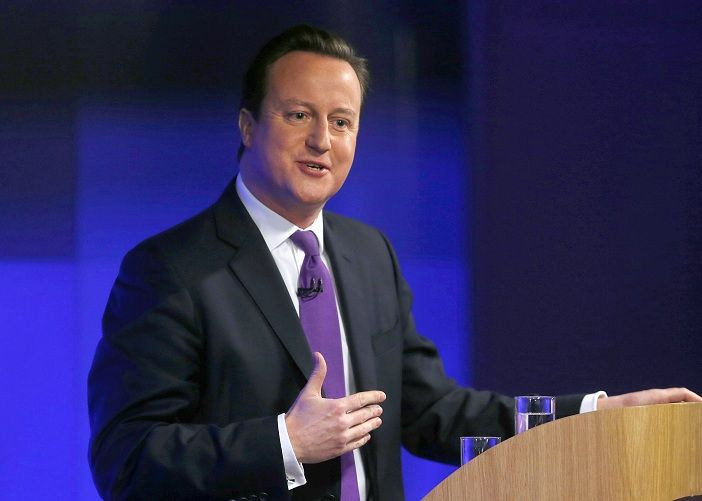David Cameron And China: Could The Dalai Lama Cost Britain Billions In Trade And Investments?

British Prime Minister David Cameron has found himself in an extremely difficult jam between two intransigent forces – the Chinese government and the Dalai Lama – and it could cost the U.K. billions of pounds in trade and investment.
Chinese officials have advised Cameron to stop meeting with the Tibetan spiritual leader lest Beijing pulls out of huge infrastructure investments in London and elsewhere.
Cameron met with the Dalai Lama last year and also in 2008, angering the power brokers in China every time -- Beijing regards the Dalai Lama as a troublesome separatist.
In May 2012, after Cameron and Deputy Prime Minister Nick Clegg met privately with the Dalai Lama at St Paul’s Cathedral in London, Beijing warned of “serious consequences.”
Song Tao, China’s vice foreign minister, told the U.K. ambassador in Beijing, Sebastian Wood, that the meeting had “seriously interfered with China’s internal affairs.” Song advised Britain to take “practical actions to correct the error.”
According to the London Evening Standard newspaper, if the Chinese make good on their threats, a loss of investments would, among other things, scuttle plans for a new £50 billion ($78 billion) hub airport in the Thames Estuary -- London Mayor Boris Johnson has been counting on the Chinese to bankroll this huge project.
The London Chamber of Commerce and Industry is also looking for foreign investors (including possibly deep-pocketed Chinese) to fund various other infrastructure projects in the U.K., particularly in the high-speed railways sector.
However, all this could vanish if Cameron again agrees to meet with the Dalai Lama. Consequently, the prime minister has to tread delicately.
Richard Ottaway, chairman of the Commons foreign affairs committee, has urged Cameron not to be bullied by the Chinese.
“We are right to resist external pressures,” Ottaway said, according to the Standard.
“The Dalai Lama has always been welcome in Britain and I hope it remains that way. I think this will quickly blow over and investment will flow both ways.”
Cameron’s office, which declared that the prime minister has no current plans to meet with the Dalai Lama, issued a tepid statement on the Chinese matter.
“It is perfectly right for the prime minister to be able to choose who he wants to meet,” Downing Street said in a statement.
“We want to deepen our relations with China and indeed we already are. U.K. exports to China grew faster than any of our main European partners last year, and we were the only EU country to benefit from increased trade and investment.
“Of course we engage with China on a huge range of issues, on some we agree, on others we disagree, but we strongly believe it is in the interests of both countries to manage our differences with respect, and cooperate as much as possible.”
Addressing the Tibet issue specifically, Cameron’s office said that its position is “longstanding and clear.”
“We regard Tibet as part of the People’s Republic of China,” Downing Street said.
“The [Prime Minister] spoke to [Chinese] Premier Li Keqiang in March and they agreed that they looked forward to meeting and continuing to strengthen relations in due course.”
Angus Walker, the China Correspondent at Britain’s ITV News, reported that the Chinese government is indeed pressuring London to distance itself from the Dalai Lama.
“Chinese officials are hinting that they want to secure a face-saving apology from Downing Street after David Cameron's meeting with the Tibetan spiritual leader last year,” he wrote.
Walker added that a spokeswoman for China’s foreign ministry said Beijing wants “concrete measures” from British diplomats regarding its stance on the Tibetan spiritual leader – but did not explain what these “measures” would entail.
The Daily Telegraph asserted that Cameron – who has not visited Beijing in three years – is effectively “barred” from going to China due to the impasse over the Dalai Lama.
Cameron was scheduled to visit China last fall, but that trip was canceled. Similarly, plans for the new Chinese premier Li’s proposed visit to Britain were shelved.
“We all know that the relationship between China and the U.K. was undermined by David Cameron meeting the Dalai Lama and this is not something we are willing to see,” a Chinese foreign ministry spokesman told the Telegraph.
Still, China’s fingers are already deep into Britain -- last year, The China Investment Corp., Beijing’s sovereign wealth fund, purchased a 10 percent interest in Heathrow Airport (valued at £450 million), and an 8.68 percent stake in Thames Water Utilities Ltd., London’s private public water and wastewater utility. The Fund also has a one-third ownership in London’s Canary Wharf financial district.
Last year, China poured some £8 billion into the U.K. – an all-time record – and quintuple the amount from just two year ago.
British goods moving to China amounted to some £10.5 billion in 2012, a 13 percent jump in just one year.
Thus, Britain has an enormous amount at stake with respect to China.
“The U.K. has not fully grasped the significance of the handover to the new leaders [in China], and we have got off on the wrong foot,” Alistair Michie, the deputy chairman of the 48 Group, a pro-China British trade organization, told the Telegraph.
“None of our leaders has a personal relationship with any of the new Chinese leaders, and relationships are key to doing business with China.”
© Copyright IBTimes 2024. All rights reserved.




















